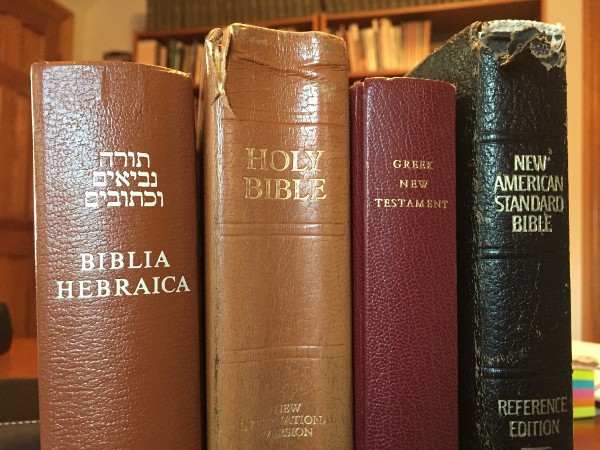I want to know more about all things
“Then I wanted to know more…” – Daniele 7:19
It was really exciting to study the book "Pay Attention to Daniel's Prophecies!" and all the prophecies that have come through the centuries have shown, beyond any doubt, the infallibility of the word of God. It is indispensable to compare the biblical book of Daniel to understand many things concerning the Revelation of John because both speak of "the time of the end" and each one completes and reveals interesting details. – Daniel 11:35, 40; Revelation 4:1
Of course, Daniel is not the only book that has been examined because "all scripture is inspired of god and beneficial" and all that has been written serves for "our instruction". – 2 Timothy 3:16, 17; Romans 15:4
It is worth noting, however, that referring to the last days of the "system of things" this book was mentioned by Jesus himself. – Matthew 24:15
The biblical book of Revelation also speaks of the last days (and extends until the end of the millennial kingdom) and then confronting them was the most natural thing to do. Moreover, it is Daniel's book again that tells us that knowledge would become plentiful in the last days. – Daniel 12:4
It would be wise, especially for those who believe that they have already understood everything, to question even if this can be extremely difficult. Biblical history tells us that the people of God themselves have repeatedly misguided expectations. (Acts 1:6) It is not a mystery that even the modern people of God on earth have fed false expectations and have had to revisit the understanding of certain scriptures several times; so we should accept that there is at least the possibility that there are still Scriptures misinterpreted at present. One should also accept the possibility that a misunderstood Scripture is not always a marginal thing: we may have even understood certain fundamental truths badly. We, as servants of God, should not have "political" positions just because change can be difficult or painful. We should only be concerned with the truth. – Psalm 119:97; John 17:17; 18:37
Daniel had the privilege of communicating directly with the angel Gabriel and thus having "trustworthy information" directly from the Source. We do not have this privilege for which we have to rely on Scripture (2 Timothy 3:16, 17), prayer and meditation. It is clear that all of our preconceived beliefs could prevent the flow of Scripture despite the profound commitment. If, for example, we had the absolute conviction that a certain occurrence occurred on a specific date (1914, 1919 or any other date), we will be spontaneous, almost unconsciously, adapting the scriptures associated with that event to that specific date. Later, by the natural domino effect of these interpretations, it could lead to real forcing to bring together other events related to each other but it will be very difficult to consider them as such. Could it have happened to us?
As with the scientific method, we should not look for those scriptures that would seem to confirm a certain understanding (Scriptures to which we would arrive anyway), but just those scriptures that, at least apparently, would seem to weaken or even affect that understanding. This method has the effect of further strengthening many current comprehensions. Daniel could speak with the angel and therefore was not required to do such a thing, but he also had to study the Scriptures carefully to understand how long his people would be exiled in Babylon. – Daniel 9:1, 2
By careful comparison not only with Daniel's biblical book, but with all Scripture, it is inevitable to question some of the acquired truths, but every deduction will seek to have the support of Scripture (which is then the only thing that counts). There is also a completely hypothetical and speculative part. When the false prophet "puts under compulsion all people … that these should be marked [with] the mark of the wild beast” (Revelation 13:16,17), we have no scriptural precedents to which to reconnect, and moreover, if this scripture speaks of future events, then we could do nothing but suppositions.
Sometimes a series of clues are presented to identify a subject, as for Babylon the Great, and so it is up to us to evaluate these clues in an accurate and uninterested manner. In this and in other cases, hypotheses will be made in the light of historical or other information to try to figure out what might be referred to and in some cases a number of possibilities will open up. Possibilities, not acquired truth.
Daniel's same desire should lead us to assess the apparent inconsistencies of our current understanding and see if there is a better answer in the Bible. We must not underestimate the importance of prophecy (Thessalonians 5:20), and while acknowledging that faith in Jehovah and Jesus Christ can not only be based on this, it is an integral part of the Word of God which is useful for salvation (2 Timothy 3:15). Let us therefore hope that the people who have had the courage to endure the persecution in past world wars, who have had the humility to change the intent of some scriptural references when necessary, may continue to have the desire to want to know more about all things.
Please visit the original and updated blog, in italian language, at this link
https://attenzioneallaprofezia.blogspot.it/
It was really exciting to study the book "Pay Attention to Daniel's Prophecies!" and all the prophecies that have come through the centuries have shown, beyond any doubt, the infallibility of the word of God. It is indispensable to compare the biblical book of Daniel to understand many things concerning the Revelation of John because both speak of "the time of the end" and each one completes and reveals interesting details. – Daniel 11:35, 40; Revelation 4:1
Of course, Daniel is not the only book that has been examined because "all scripture is inspired of god and beneficial" and all that has been written serves for "our instruction". – 2 Timothy 3:16, 17; Romans 15:4
It is worth noting, however, that referring to the last days of the "system of things" this book was mentioned by Jesus himself. – Matthew 24:15
The biblical book of Revelation also speaks of the last days (and extends until the end of the millennial kingdom) and then confronting them was the most natural thing to do. Moreover, it is Daniel's book again that tells us that knowledge would become plentiful in the last days. – Daniel 12:4
It would be wise, especially for those who believe that they have already understood everything, to question even if this can be extremely difficult. Biblical history tells us that the people of God themselves have repeatedly misguided expectations. (Acts 1:6) It is not a mystery that even the modern people of God on earth have fed false expectations and have had to revisit the understanding of certain scriptures several times; so we should accept that there is at least the possibility that there are still Scriptures misinterpreted at present. One should also accept the possibility that a misunderstood Scripture is not always a marginal thing: we may have even understood certain fundamental truths badly. We, as servants of God, should not have "political" positions just because change can be difficult or painful. We should only be concerned with the truth. – Psalm 119:97; John 17:17; 18:37
Daniel had the privilege of communicating directly with the angel Gabriel and thus having "trustworthy information" directly from the Source. We do not have this privilege for which we have to rely on Scripture (2 Timothy 3:16, 17), prayer and meditation. It is clear that all of our preconceived beliefs could prevent the flow of Scripture despite the profound commitment. If, for example, we had the absolute conviction that a certain occurrence occurred on a specific date (1914, 1919 or any other date), we will be spontaneous, almost unconsciously, adapting the scriptures associated with that event to that specific date. Later, by the natural domino effect of these interpretations, it could lead to real forcing to bring together other events related to each other but it will be very difficult to consider them as such. Could it have happened to us?
As with the scientific method, we should not look for those scriptures that would seem to confirm a certain understanding (Scriptures to which we would arrive anyway), but just those scriptures that, at least apparently, would seem to weaken or even affect that understanding. This method has the effect of further strengthening many current comprehensions. Daniel could speak with the angel and therefore was not required to do such a thing, but he also had to study the Scriptures carefully to understand how long his people would be exiled in Babylon. – Daniel 9:1, 2
By careful comparison not only with Daniel's biblical book, but with all Scripture, it is inevitable to question some of the acquired truths, but every deduction will seek to have the support of Scripture (which is then the only thing that counts). There is also a completely hypothetical and speculative part. When the false prophet "puts under compulsion all people … that these should be marked [with] the mark of the wild beast” (Revelation 13:16,17), we have no scriptural precedents to which to reconnect, and moreover, if this scripture speaks of future events, then we could do nothing but suppositions.
Sometimes a series of clues are presented to identify a subject, as for Babylon the Great, and so it is up to us to evaluate these clues in an accurate and uninterested manner. In this and in other cases, hypotheses will be made in the light of historical or other information to try to figure out what might be referred to and in some cases a number of possibilities will open up. Possibilities, not acquired truth.
Daniel's same desire should lead us to assess the apparent inconsistencies of our current understanding and see if there is a better answer in the Bible. We must not underestimate the importance of prophecy (Thessalonians 5:20), and while acknowledging that faith in Jehovah and Jesus Christ can not only be based on this, it is an integral part of the Word of God which is useful for salvation (2 Timothy 3:15). Let us therefore hope that the people who have had the courage to endure the persecution in past world wars, who have had the humility to change the intent of some scriptural references when necessary, may continue to have the desire to want to know more about all things.
Please visit the original and updated blog, in italian language, at this link
https://attenzioneallaprofezia.blogspot.it/




Comments
Post a Comment